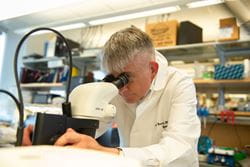Password Reset
Forgot your password? Enter the email address you used to create your account to initiate a password reset.
Forgot your password? Enter the email address you used to create your account to initiate a password reset.
 Pitt researchers are working to discover effective treatments for a rapidly progressive and incurable neurodegenerative disease. In a paper published in Nature Communications, a team led by professor of neurology and UPMC Endowed Chair of movement disorders Edward A. Burton, MD, DPhil, FRCP, developed a novel zebrafish model of progressive supranuclear palsy (PSP).
Pitt researchers are working to discover effective treatments for a rapidly progressive and incurable neurodegenerative disease. In a paper published in Nature Communications, a team led by professor of neurology and UPMC Endowed Chair of movement disorders Edward A. Burton, MD, DPhil, FRCP, developed a novel zebrafish model of progressive supranuclear palsy (PSP).
Dr. Burton and his group identified a regulatory protein that is conserved between zebrafish and humans and that drives the neurological deficits characteristic of PSP through an unexpected mechanism. The team hopes that existing experimental drugs that target this protein for blood cancers could provide a starting point for developing drugs for PSP. Because of similarities between PSP, Alzheimer’s disease and chronic traumatic encephalopathy pathologies, Dr. Burton thinks that understanding PSP may also have important implications for these other conditions.
“PSP produces a miserable combination of movement, swallowing, communication, and cognitive difficulties that often do not respond even to symptomatic treatment and rob patients of their independence,” said Dr. Burton. “We hope to work with industry and academic partners to develop new drugs and enter them into the clinical trials testing pipeline to eventually bring effective treatments to the many patients that we see in our clinics.”
Dr. Burton and team are working closely with UPMC Enterprises, the venture capital arm of UPMC, in support of this research.